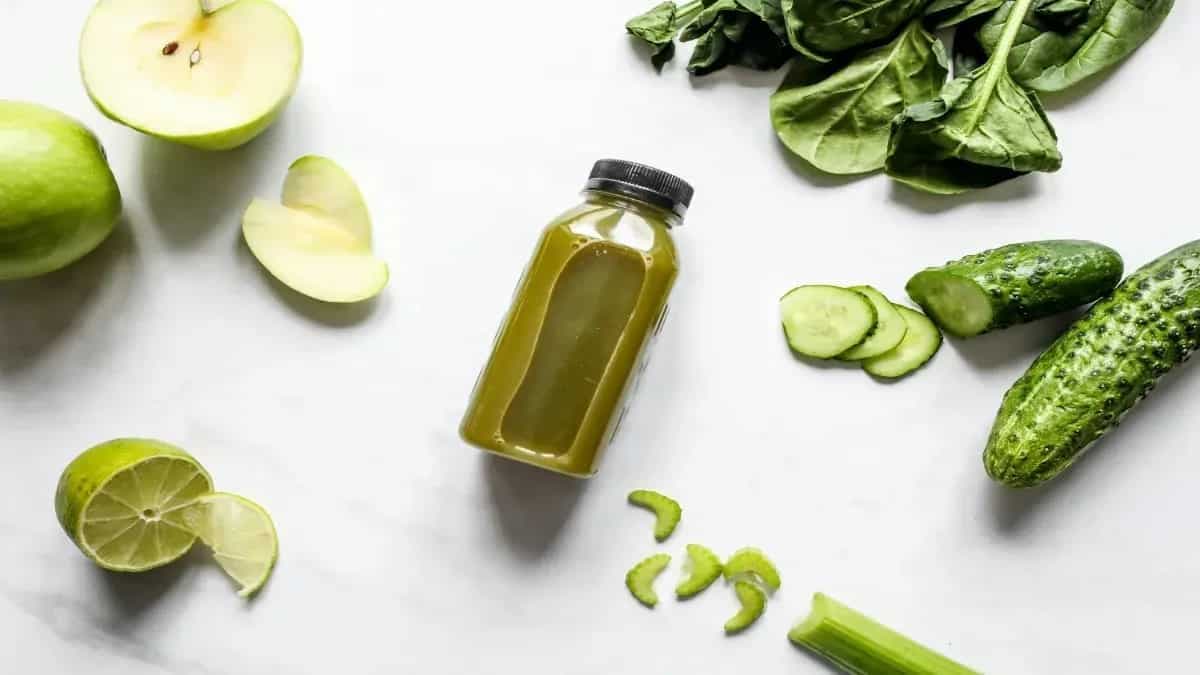Certain veggies are thought to be healthier when juiced, according to researchers. Juicing a certain vegetable merely increases the amount of vitamins and proteins it contains. However, some green vegetables taste better when juiced. These are the exceptions. Broccoli, for example, becomes a rather bitter vegetable when cooked.
But you won't be reluctant to eat this nutritious green vegetable if you juice it and mix it with a teaspoon of curd or honey. You can also juice up some additional vegetables and include them in your diet. To make this veggie juice more intriguing, you must add some tasters.
This way, you can enjoy your nutritious glass of goodness and get rid of that raw taste. Thus, continue reading!
9 Vegetable Juices To Drink After Dinner
1. Spinach
One of the most excellent leafy greens to juice is spinach. It has very little rough fibre and requires gradual juicing to obtain the juice, so there are no problems with stuck gears or difficult cleanup after juicing. Despite its mild flavour, spinach is a nutritional powerhouse of iron, vitamin K, folate, magnesium, and vitamin A. A small amount increases the amount of nutrients and antioxidants in your drink.
2. Cucumbers
Cucumbers have high water content and subtle flavour. They are very effective juicers because they are composed of about 96% liquid. In addition, cucumbers provide a cool, refreshing juice that is rich in cucurbitacins, which reduce inflammation, and vitamin C, which boosts the immune system. They go well with almost any veggie or fruit.

3. Celery
Like cucumbers, celery can have a water content of up to 95%, and like spinach, it is best juiced with a cold press juicer. Celery juice provides anti-inflammatory minerals and hydrating electrolytes, such as salt and potassium. Celery tastes fairly strong when eaten raw, but it tastes very mild when juiced. It makes delicious vegetable juice with sweeter vegetables like apples or carrots.

4. Carrots
Carrots are an excellent vegetable to juice via a cold-pressed juicer because of their high water content, which ranges from 86 to 95%. When sliced into tiny pieces before putting them through the juicer, carrots make good juice, even though they are slightly rougher and higher in fibre than other vegetables. The resultant carrot juice is exploding with beta-carotene, the antioxidant responsible for carrots' vivid orange colour. Carrot juice is a great foundation for juices that feature vegetables because it's tasty and healthy.

5. Tomatoes
Another excellent option for soft-cell structure and water density is a juicy tomato, which is composed of approximately 94% liquid. Tomatoes can be cold-pressed to extract vitamin C, potassium, and lycopene. Tomatoes work wonderfully with any mix of fruits or vegetables. Try combining tomato juice with blueberries, strawberries, and carrots to make your special juice.

6. Bell Peppers
Crunchy bell peppers are an excellent vegetable for cold-pressed juicers because of their soft-cell structure and 92% water content. Bell peppers' exceptional vitamin C and antioxidant richness come through in juice form. Use green peppers for a neutral flavour. Red and yellow add a hint of sweetness to the juice.

7. Beets
A cold-press juicer works surprisingly well at juicing beets. Despite their high natural sugar content, their cell structure is sufficiently flexible to provide a dark purple, nutrient-rich juice when sliced into small pieces or cooked before being juiced. Juiced beets provide antioxidants, folate, manganese, and vitamin C. They are regarded as a superfood. Choose softer flavours for your mix when using beetroot juice so that its earthiness won't overshadow the flavour.

8. Zucchini
For its high water content and soft skin, courgette is a fantastic vegetable to run through a cold press juicer. Zucchini provides antioxidant carotenoids, vitamin C, and manganese in addition to its hydration-promoting qualities. Due to its bland flavour, zucchini pairs well with almost any other vegetable. It adds vitamins and moisture without significantly altering the taste of your finished juice.

9. Cabbage
When cold-pressed, cabbage, a vegetable you might not think of for the juicer, retains an unexpected amount of juice. It is dense and crisp when eaten raw. For instance, red cabbage gives juice an earthy taste and brilliant colour. Cabbage juice not only keeps you hydrated but also contains glucosinolates, which may be able to prevent cancer. If you want a low-sugar, healthful juice, it goes nicely with other veggies.

Naturally, this concentrated vegetable juice contains vitamins, minerals, and antioxidants, making it a fantastic addition to a regular diet. Taste these drinks!


